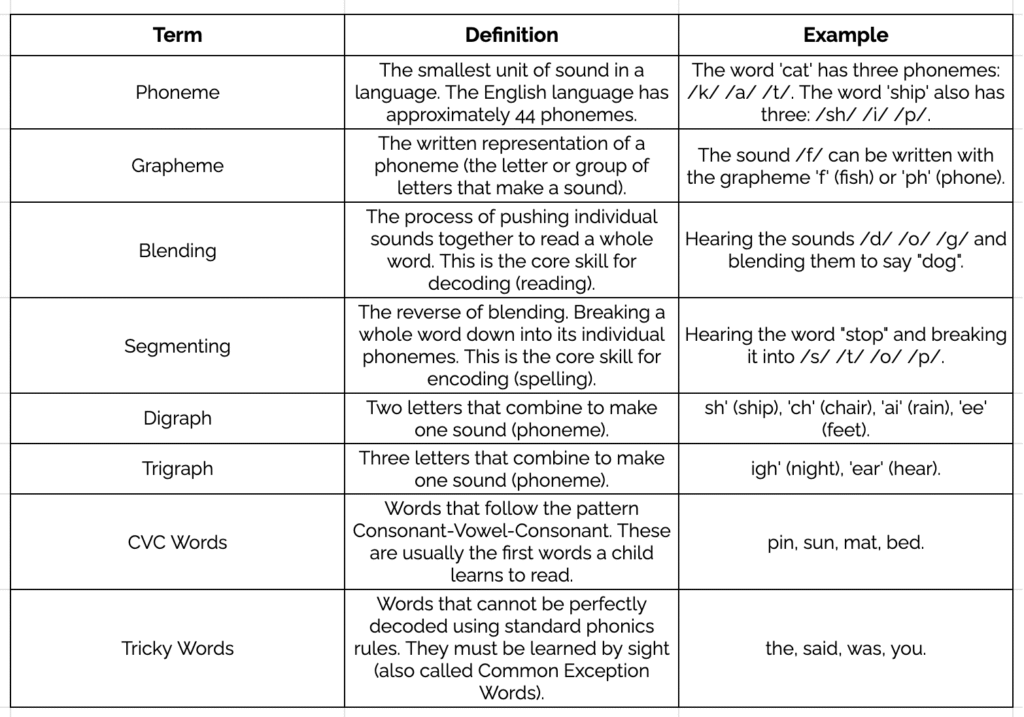What is Phonics? A Dubai Parent's Guide to Early Reading Success
If you have a young child in a Dubai school, you’ve undoubtedly heard the term “phonics.” It’s a central focus during early years education (FS1/KG1 onwards) and a frequent topic in KHDA (Knowledge and Human Development Authority) school reviews and inspections. But what exactly is it, and why is it so crucial?

Phonics is a method for teaching reading and writing by developing learners’ phonemic awareness—the ability to hear, identify, and manipulate sounds. It involves mapping these sounds (known as phonemes) to their corresponding written letters or groups of letters (known as graphemes). Essentially, phonics provides the code children need to decode the English language, forming the foundation of literacy instruction in most Dubai curricula.
This guide will demystify phonics, explain why it is the preferred method for teaching reading in the UAE, and define the key terminology you need to know.
Why is Systematic Synthetic Phonics (SSP) the Standard in Dubai?
In the past, children were often taught to read using the “Whole Word” or “Look and Say” method. This approach relied heavily on memorizing entire words and using picture cues to guess the text.
However, decades of research, collectively known as the Science of Reading, have proven that this approach is ineffective for a large percentage of students. It doesn’t provide children with the skills to read unfamiliar words independently.
Today, the gold standard is Systematic Synthetic Phonics (SSP).
Systematic Synthetic Phonics (SSP) is the standard because research proves it is the most effective way to teach children to read. Unlike older methods that relied on memorization, SSP teaches children how to decode words by synthesizing (blending) sounds from left to right, providing a reliable strategy for tackling new words.
The Shift to the Science of Reading
SSP teaches children to explicitly connect letters to their sounds (synthetic) and does so in a clearly defined sequence (systematic).
Why “Whole Word” Fails: The English language has too many words to rely on visual memory. When children taught this way encounter complex texts without pictures, their reading ability often plateaus.
Why SSP Succeeds: SSP empowers children by teaching them the alphabetic code. Once they know the fundamental sounds, they can decode the vast majority of the English language.
In Dubai, the British Curriculum (EYFS and National Curriculum) mandates the use of SSP. Increasingly, top-tier American, Indian (CBSE/ICSE), and International Baccalaureate (IB PYP) schools are also adopting structured phonics approaches due to their proven effectiveness.
The Key Terminology of Phonics (The Building Blocks)
Understanding the jargon used in your child’s phonics lessons and school reports is essential for providing support at home. Here is a glossary of the most critical terms:

How Does Phonics Benefit EAL Learners in Dubai?
Dubai is a uniquely multilingual environment. For the vast majority of students in international schools, English is an Additional Language (EAL). In this context, structured phonics is not just beneficial—it is essential.
While many EAL children develop conversational English quickly, academic English requires a much deeper understanding of the language’s structure.
Phonics provides the following specific benefits for EAL learners:
Explicit Instruction: EAL learners cannot rely on an “intuitive” understanding of English sounds. Phonics provides a clear, explicit structure for understanding how the language works.
Pronunciation Clarity: Phonics instruction helps children distinguish between similar-sounding English phonemes that may not exist in their native language (e.g., distinguishing ‘p’ and ‘b’ for Arabic speakers, or ‘v’ and ‘w’ for others).
Vocabulary Acquisition: When an EAL student encounters a new word, strong phonics skills allow them to decode it accurately. This makes it easier to connect the word to its meaning and integrate it into their vocabulary.
Confidence and Independence: Phonics gives EAL learners the tools to tackle English texts independently, reducing their reliance on teacher support and accelerating their progress in all subjects.
While schools provide a foundational education, the pace in Dubai can be rapid. Many EAL students benefit significantly from targeted, expert phonics instruction in Dubai to ensure these foundational skills are securely embedded.
Phonics Across Different Dubai Curricula
While the goal of literacy is universal, the approach to phonics can vary depending on the school’s curriculum:
British Curriculum (EYFS/National Curriculum)
This is the most rigorous. Phonics is central to the Early Years Foundation Stage (EYFS) and Key Stage 1. The approach is highly structured, following defined phases (Phase 1 to Phase 6), often using programs like Jolly Phonics or Read Write Inc. A significant milestone is the Year 1 Phonics Screening Check, a mandatory assessment of decoding skills.
International Baccalaureate (IB PYP)
The IB Primary Years Programme (PYP) traditionally integrates phonics within its inquiry-based learning framework. However, recognizing the need for explicit instruction, many IB schools in Dubai now supplement their program with structured phonics systems (often adopting British SSP models) to ensure foundational skills are met.
American and Indian Curricula (Common Core/CBSE/ICSE)
American curricula, often following Common Core standards, include foundational reading skills that emphasize phonics and phonemic awareness. Similarly, Indian curricula (CBSE and ICSE) are increasingly adopting structured, explicit phonics instruction in the early years to support English literacy.
Conclusion: The Foundation for Success
Mastering phonics is the single most important element in your child’s early academic journey. In the competitive, English-medium educational landscape of Dubai, a strong foundation in reading opens doors to comprehension, critical thinking, and lifelong learning.
By understanding the principles of phonics, you can better support your child’s development and ensure they have the code they need to become fluent, confident readers.
Ready to Give Your Child a Reading Advantage?
If you are concerned about your child’s reading progress, or if you want to ensure they have the strongest possible foundation, specialized support can make a significant difference.